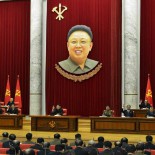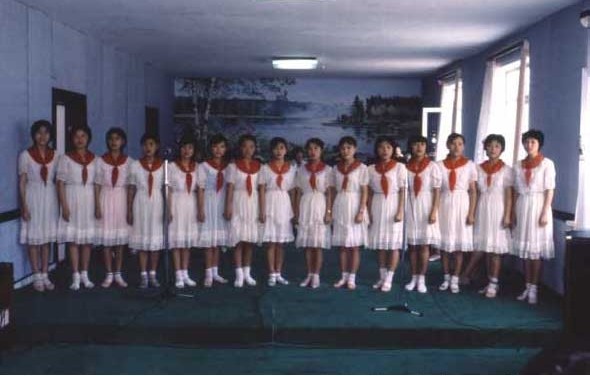The Personal Secretariat
Kim Jong-il’s Personal Secretariat (which is known in its rare mentions in the North Korean press as “the secretarial office of the Central Committee”) is his executive office within the Korean Workers’ Party. The Personal Secretariat finds it Western equivalents in the US Secret Service and the White House Office.[i] It manages the flow of paperwork to and from Kim Jong-il, as well as coordinating his schedule, security, logistical and domestic arrangements.
Kim Jong-il prohibits the Personal Secretariat from initiating and formulating policy. While it has a staff of advisers with whom Kim Jong-il deliberates on policies they are not active participants in the DPRK’s policy process. This allows debate and discussion on current affairs to occur while retaining the characteristic of the monolithic ideological guidance system. The Personal Secretariat’s Consolidation Division is Kim Jong-il’s gatekeeper, managing the reports, documents and policies he reviews. The Consolidation Division links to the Document #120 Office and the KWP General Affairs Department which manage paperwork and document delivery in the central party.
The Personal Secretariat’s Main Office of Secretaries manages foreign affairs. It is responsible for the reports and communications submitted from DPRK diplomatic representatives. It also collects reports from, and manages, Kim Jong-il’s unofficial overseas network that submits information and procures items for him.

Aides from the Personal Secretariat (C and R) assist with a presentation of gifts during Kim Chong-il's visit to performers' apartments in October 2010
The Office of Adjutants manages the bodyguard corps and links to the Guard Command, tasked with Kim Jong-il’s and the Kim Family’s personal security. The Personal Secretariat also links to the Guard Command’s Security Department to manage his telephone, fax and internet requirements for issuing orders and receiving communications
Another Personal Secretariat subunit is the Cadres’ 5th Section[ii] which recruits, trains and staffs ensembles of female singers, musicians and dancers (such as Wangjaesan Dance Troupe) who entertain to Kim Jong-il. The Cadres 5th Section also contains the so-called Joy Brigade who, among other interactions, provide massages and witty conversation.
The Personal Secretariat is also comprised of other departments and offices which manage Kim Jong-il’s residential and domestic life (chefs, food, and housekeeping). Several offices manage Kim Jong-il’s (and Kim Family) personal financial holdings and expenditures, as well as purchase goods (food, furnishings, and appliances/technology) in Europe and East Asia. The Personal Secretariat links to the Third Floor (also known as Offices #35, #38 and #39). The Third Floor collects intelligence, manages legitimate and illicit overseas businesses, and ensures other revenues from SOE’s and party-owned trading corporations are tithed to Kim Jong-il. These monies are used, in part, to finance Kim Jong-il’s and the Kim Family’s private and household life.[iii]

Personal Secretariat offices and facilities at KJI's hunting lodge and residential complex near Anju-si, South Pyongan
Personal Secretariat employees tend to enjoy lengthy job tenure—senior staff has worked in this capacity for Kim Jong-il for over 20 years. There are also several hundred administrative, technical and domestic staff dispersed at several of his residential complexes. Other Personal Secretariat managers and staff reside in designated apartment housing on Changgwang Street in the Central District of Pyongyang, across the street from Kim Jong-il’s official residence and office. Many Personal Secretariat employees have direct, multi-generational ties to the Kim Family.
The top six Personal Secretariat Employees hold the rank of deputy director in the CC KWP Organization Guidance Department. Some subordinate employees, such as the women of the Cadres 5th Section hold junior officers’ ranks in the KPA while other administrative and technical personnel hold an equivalent civilian rank in the party or government hierarchy. The ranking of Personal Secretariat employees serves as a cover which provides them access to income, and benefits for health (medical treatment at the Ponghwa Clinic, the Central Military Hospital, or Namsan Clinic) and education (attendance at Changgwang Kindergarten, Namsan Senior Middle School or Kim Il Sung University).
The current leadership of the Personal Secretariat is not known.[iv] Kim Jong-il’s private secretary is Kim Kang-chol. One of Kim Jong-il’s closest and most trusted aides in the Personal Secretariat is Kim Chang-son[v], previously a military attaché and director of the KWP Administration Department from 1984 to 1992. Until his June 2010 death, among his many tasks, Ri Je Gang managed the Cadres’ 5th Section.
Two of Kim Jong-il’s older children work in various capacities for the Personal Secretariat. Daughter Kim Sul-song has been identified as director of Office #99[vi], but she has also been identified as managing some of Kim Jong-il’s scheduling and security arrangements, as well regularly traveling with him on guidance tours. Eldest son Kim Jong Nam, who divides his time between the DPRK and China, manages some of his father’s personal and financial affairs. He also serves as one of his father’s personal representatives to DPRK elites who reside in China and Europe.
See also:
Gause, K.E. “The North Korean Leadership: Systemic Dynamics and Fault Lines” in North Korean Policy Elites (Kongdan Oh Hassig, ed.) Alexandria, VA: Institute For Defense Analyses, 2004.
[i] The White House Office is a subunit of the Executive Office of the President which provides the US President with policy advice and scheduling, advance (security and event management), clerical/administrative and household support.
[ii] 5th Section, 5th Office or 5th division are also general use terms applied to offices or employees that report to Kim Jong Il (or the Personal Secretariat).
[iii] The Personal Secretariat is the central agency of the DPRK’s court economy. Third Floor revenues and items (automobiles, appliances) procured by its staff are also distributed to DPRK elites and other government, military and party leaders. This is part of the Personal Secretariat’s political patronage mission. One of its subordinate offices receives and processes petitions and requests from DPRK elites to travel, or receive education or medical treatment in Asia or Europe
[iv] Several reports identified Kim Ok as having assumed daily management of Kim Jong-il’s schedule. She was also rumored to have coordinated reporting and paper traffic following his August 2008 stroke. Another report alleges that Ms. Kim no longer works for the Personal Secretariat.
[v] Kim Chang-son is a widower who has close personal ties to Kim Kyong Hui and Jang Song Taek. He has served as KJI’s unofficial “body man” for a number of years. Kim controls some of the Personal Secretariat’s interactions with the State Security Department.
[vi]Office 99 is the Personal Secretariat’s coordinating office with the CC KWP Military Industry Department and Second Economic Committee.



